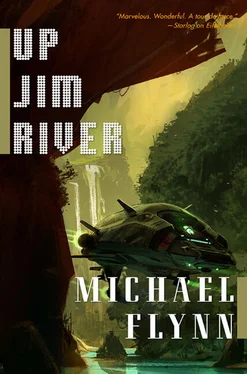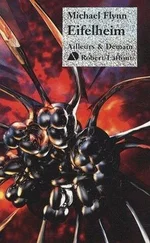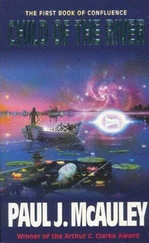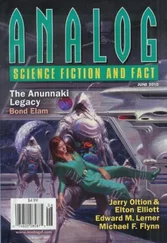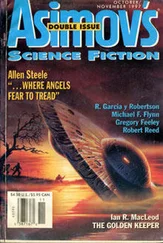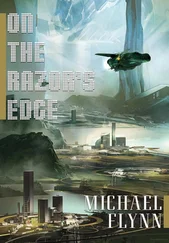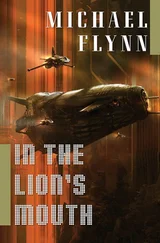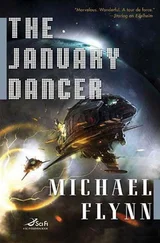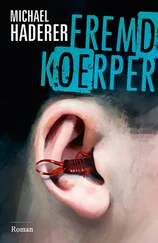Openings indeed. The Great Hall on Folkinward Station was lined with booths rented out to the various companies, each under its own colorful banner, and it was to these that the bulk of Siddiqi’s disembarking steerage swarmed. Why pass through Harpaloon Customs if you were only going somewhere else? The famous “Floating Dome” overarched lounges and restaurants, jugglers and magicians, venues for simulated, interactive, recorded, and live performances. A minstrel bowed a Keller’s viol in a reasonable rendition of a recently popular tune. Here and there, someone famous (or infamous) had gathered a tail of followers—newsers, websters, admirers—much like a comet approaching its sun.
Above their heads, but below the springline of the dome, stretched the famed Harpaloon Murals, painted fifty years before by Hendrik Pak Gbọnju. Bold, broad, bigger than life, they portrayed the great migrations of the mythic past. Thick-hewn men and resolute women moved west in ox-drawn “prairie schooners,” Cossacks trudged east through S’birski snows, Zhõgwó families creaked in great two-wheeled carts up the Gansu Corridor, Magreebees homesteaded in the decaying suburbs of Yurp. Across the banks of the Great Fish River, Four-trekkers heading north greeted Mantu cattlemen heading south. Here, too, legendary figures posed: Jacinta Rosario peered across the rusty sands of Mars; Yang huang-ti pointed dramatically to the lichen-covered plains of Dao Chetty; Chettiwan Mahadevan, hands a-hip, stared at the crumpled ruins of the first-found prehuman city on New Mumbai.
It was all very improbably epic, the harper thought while standing on line for Inbound Customs. Gbọnju’s imagination had wrestled with history and had pinned history defeated to the mat. Most heroes didn’t know at the time that they were, and seldom had occasion to strike dramatic poses. Rosario was certainly a myth, a storybook character; and the same was likely true of Yang. And while Mahadevan was known to history, his story was surely embellished beyond recognition.
The lander gate for Preeshdad Town was crowded: fellow passengers from Srini Siddiqi , private travelers, movers with time to kill before their ark departed, customs and immigration shift-workers returning home for their “down” time. The harper and the scarred man were among them, for it was from Preeshdad that Bridget ban had checked in with the Kennel.
Nearby, but a little apart, stood a hatchet-faced man and a wife with lips pulled as tight as harp strings, and two small children in nondescript clothes and terribly solemn faces. Méarana heard snippets of fierce, whispered conversation.
“I told you we’d be late. I told you.”
“They said they’d hold our berth. How’d I know they would give it away?”
“You could’ve got us here on time. What do we do now?”
“There’ll be a second voyage. They promised.”
“Like they promised to hold our berths? What’ll we live on until then? Those tickets took our last ducats. We need that money.”
“Cash the tickets in, and you can kiss TenBeck’s World good-bye. We’ll never save up…”
Perhaps they noticed the harper, for they lowered their voices still further and moved off a distance, followed by their bewildered and silent children. Donovan chuckled.
“Behold, the noble pioneers!”
“Must everything be with you a bone of contention? When I set out to find you, I had expected a better man at the end of the hunt.”
“Instead, you found only a man, more or less.”
“Rather more than less.” She tapped him on the forehead with her finger. “When do I meet these others that you carry with you?’
The scarred man backed away. “They come out when the Fudir and I let them. He and I are the consuls of our little republic.”
The harper glanced once more at the mover family. She was not so foolish as to confuse the particular with the general, and already she was limning the encounter in a goltraí, a lament for a lost world. What sadder fate than to lose your future?
Pwairt na Pree, the groundside shuttle field, lay in the Jazz plains, a few leagues east of the capital. It handled trans-global semi-ballistic shuttles as well as ground-orbit traffic, and most of the passengers who downsided with Donovan and Méarana swarmed off to their connecting gates, bound for newly-opened townships in what the locals called the Boonlands. Even so, the monorail platform outside the terminal was crowded with those eager to sample the city life of Preeshdad itself.
A warm, gritty wind tore at their clothing when they stepped out onto the platform. Cloaks billowed and hats fled the heads of those who wore them. The green banner of the planetary league snapped in the stiff breeze: a golden harp enfolded by a silver crescent moon.
That flag logo reminds me of something, said the Pedant.
What doesn’t? jeered the Sleuth.
The scarred man’s head jerked here and there, as the desires of some of him to study the flag struggled with desires of others to watch their companions on the platform.
«There could be danger here,» said Inner Child.
“Are you ill?” A woman standing beside the scarred man reached out to him to steady him, but Inner Child cried out and pulled back.
“It’s all right,” Méarana assured the doubtful woman. “It’s a muscle spasm. He gets them sometimes.” She held tight to his arm.
The Fudir calmed his disparate mind and bowed to the woman. “Thankee, missy. You much kind this-man.”
But the woman was not reassured. She, too, took a step back. “You’re a Terry,” she said and glanced half-consciously at the hand with which she had touched him. Waiting passengers, attracted by the by-play, reacted in various attitudes. One man scowled and stepped closer to the woman, fists clenched as if to defend her. Others, newly dropped from other worlds of the Periphery, pursed their lips or tsk’ed or simply turned away, but whether from distaste for the Terran or for his treatment by a local, the Fudir did not know.
“Watch ourself here,” the Fudir warned himselves. “They don’t seem well-disposed toward Terrans.”
“Considering that nowhere are Peripherals well-disposed to Terrans,” Donovan answered, “that is a considerable understatement.”
That was why Donovan preferred Jehovah. Jehovans did not like Terrans, but Jehovans did not like anyone; and as long as they did not dislike Terrans more than anyone else, Donovan counted that as warm embrace.
The train was approaching from the city, slowing with a hum of its magnets into the station platform. “It’s why we should have stayed there,” he told the others. “Like I suggested.”
The Fudir demurred. “Then who would ward our… our Méarana?”
Up until now , said the Sleuth, I don’t see that she’s needed much warding .
“Not yet. But you know where this is all heading,” said the Fudir.
Of course , said the Sleuth. I saw that back in de la Susa’s office .
Technically, it wasn’t his office.
Shaddap, Pedant.
“What if she did have to lean on us?” the Fudir said. “We’d snap. We’d break.”
“Yes,” said Donovan. “Remember the alley in Jenlùshy, when the moment came for quick and decisive action.”
If youse guys had let me take charge, like you shoulda…
“Quick and decisive, Brute. Not quick, decisive, and stupid.”
Preeshdad was the capital of Cliff na Murph, the largest of the sovereign states of Harpaloon and by default the nominal capital of the planet. She was a middling town and as ramshackle as Jenlùshy. But where Jenlùshy was often shaken down, Preeshdad was shaken up. Her buildings had the indefinable patchwork irregularity of things thrown together in haste, as if the folk of Harpaloon had been in a tearing hurry to get on with something else.
Читать дальше
